C
Calcium Carbonate A chemical (symbol CaCO3) naturally occurring in sealife shells and white rock such as limestone. In fine art printing, it is used to coat and buffer papers. |
| Calligraphy A style of typography (written) art that results in decorative and beautiful images forms from words and letters. Calligraphy artists must be highly skilled in order to layout words as art in a harmonious and elegant manner. |
 |
Canvas A heavy-duty, tightly woven fabric; rolls of specialty canvas are used in inkjet prints to produce Giclée canvas prints. After they are printed, the canvas is treated with a protective coating that guards against scratching, and dust and water damage.
Order online:
Mounted Artist Canvas
Rolled Artist Canvas |
 |
Canvas #12 A numbering system is used to differentiate between different weights of pure cotton canvas. #12 = approximately 12 oz per square yard of canvas. Gives the artist or printer a universal measurement by which to compare various canvas brands and styles.
Order online:
Unprimed #12 Canvas |
Canvas 7 oz. Any artist's canvas that weighs approximately 7 oz per square yard.
Order online:
Unprimed 7oz Canvas |
| Canvas Board Refers to canvases that are wrapped around a thin board instead of stretched over a wooden frame. These canvases are sturdy due to the backing, but are generally constructed from lower quality canvas fabric. They are easy to frame in a regular picture frame due to their thin depth. |
Canvas clips Thin metal clips that are used to hold a canvas in a frame without screwing in offset clips. The canvas clip has sharp teeth on one end which are pressed into the side of the frame's rabbet. The other side clips over the canvas, securing it. The clips are evenly distributed around the back of the frame.
Order online: Offset Clips |
Canvas Floater A style of frame ideal for a gallery wrapped canvas print or original painting. This frame overlaps the artwork from behind (instead of in front like a traditional picture frame), where the wooden frame of the canvas is affixed to the floater frame. The floater frame surrounds the canvas, separated by a gap of approximately 1/4 inch on each side, creating a “floating” effect. Floater frames are available in a variety of styles, including “stair step”, “tapered” and “L shape”.
View our large collection of canvas floater frames. |
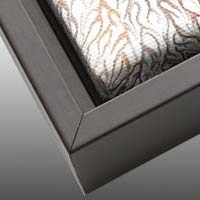 |
Canvas Pliers Used to stretch a canvas over and around a wooden stretcher bar frame. Once the canvas has been stapled to the back of one side of the frame, the next end of the canvas is held with the pliers and pulled tightly around the frame. While continuing to hold the canvas taut, staples are placed to affix the canvas to the frame.
Order online today: Canvas Pliers |
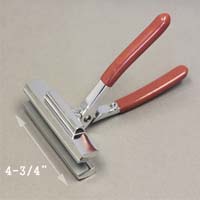 |
Canvas print A canvas print (also known as a stretched canvas) is an image printed onto canvas, generally with an inkjet printer, which is then stretched, framed and displayed.
Order your custom canvas print today. |
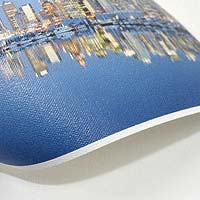 |
Canvas transfer A process which lifts the image on a print off the paper support so that it can be transferred to a canvas mount.
Place an order online: Canvas Transfers |
| Cardstock A heavyweight, smooth and durable paper often used as a backing or crafting material. In printing, it is the common stock for business cards, and can also be used for book covers. |
| Casing nail Casing nails are similar to regular, box nails, but feature a more slender head that is not much wider than the wide of the body itself. Used for laying flooring, and other projects where the nail head will remain visible so must be as visually and physically unobtrusive as possible. |
| Cassese A commercial brand that produces and sells picture framing machines, including a variety of underpinners, choppers and miter saws. They invented the first framing wedge. |
| Cast paper An artistic technique that uses wood pulp or paper fiber to craft three dimensional sculptures using a mold. It may refer to full sculpture or relief designs. One example is papier-mache. |
Cedar Cedar is considered a soft softwood, and is native to the Himalayas and Mediterranean region. Cedar wood is known to repel moths, which can be helpful in protecting artwork. There are many different subspecies of Cedar, including Red, White, Spanish, and Atlantic.
These different types are grown in different parts of the world, and all have different grain patterns and colors ranging from a pale, pinkish-white to rich brown-red. |
| Center punch A tool like an awl that is used for denting wood or metal. The dent is made using a hammer on the end of the punch, and keeps the drill from slipping when a screw or hole is drilled |
| Certificate of Authenticity An important piece of paper that verifies the legitimacy of an artwork. The CoA proves that the piece is the original or limited edition print that it claims to be. If an artwork is to be resold, the COA is a required document to ensure proper pricing. |
| Certified Picture Framer (CPF) A framer who has received certification in professional picture framing. The exam tests five areas: preservation, general knowledge, mechanical, math and mounting, and is available to anyone who has worked in the profession for a year or longer. |
| Chamois A soft leather (or today, faux leather) cloth often used for buffing and shining surfaces that may easily be scratched. |
Charcoal A light-weight substance that is dark grey or black in color. It is made up of carbon and most commonly created by heating wood in the absence of oxygen.
In art, charcoal is used to shade and sketch. "Vine" charcoal is often used, which is made by burning sticks of wood into a variety of hardnesses, which leave sharper or softer lines. Powdered charcoal may be used to cover a large surface, and charcoal pencils are also available. |
 |
| Cherry A type of hardwood, though it more commonly refers to the finish or wash applied to wood. Real cherry wood is a rich brown with pink or deep red undertones. |
 |
| Chestnut A type of hardwood that is very expensive due to over-harvesting in the early 20th century. It was praised for being very straight and resistant to rot. Today, no large enough trees exist, so the only real wood is reclaimed. More commonly, other wood is treated with a finish or wash to make it the color of chestnut wood - a deep, rich brown. |
Chop (1) Verb: To cut or slice in fluid, repetitive motion, generally wood, with a sharp, straight blade. A chopper is used to cut wood picture frame and stretcher bar moldings at 45 degree angles in preparation for assembly.
(2) Noun: an uncut length of picture frame moulding that is ready to be mitered and constructed. |
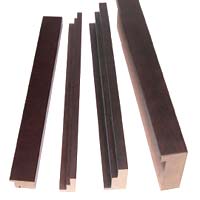 |
| Chop Mark The signature of the printer, applied to the prints produced in that workshop using a stamp or embossing. Much like the artist signs each piece. |
| Chopper The machine used to cut picture frame moldings and stretcher bar lengths. It may be controlled manually or by a motor. The knife blades of the chopper are angled at 45 degrees and meet at a point. The result is a 45 degree angle cut on both sides of the wood beam. |
| Cibachrome A photographic process that reproduces film images on photographic paper using multiple layers of dyes in a polyester base. As a result, the print is very resistant to fading and other damage over time. |
| Clamping A process of fastening two items together with a strong grip. Generally, a special tool called a clamp is used, which is tightened by twisting or pumping a lever until the required grip is achieved. In picture framing, clamps may be used to affix art temporarily to a board, or hold picture frame corners in place until an adhesive dries. |
| Clamps The tool used in fastening two items together with a strong grip. The tool is tightened by twisting or pumping a lever until the required grip is achieved. In picture framing, clamps may be used to affix art temporarily to a board, or hold picture frame corners in place until an adhesive dries. |
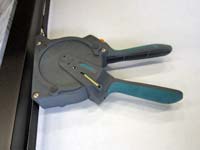 |
| Climate control Climate control is important for preserving original and significant pieces of art. Changes in humidity and temperature can cause artwork to expand, warp, discolor or begin to flake. In addition to framing with high quality, archival-grade materials, climate control will protect the artwork for many generations. |
| Clip frame Generally refers to a "frameless" picture frame, wherein the image is pressed between two sheets of glass (or a sheet of glass and a stiff backing. The artwork is held in place with clips that hook into the backing and clamp over the edge of the glass at equal intervals around the perimeter. |
CNC Controller A CNC (Computer Numerical Control) controller is the central component of a CNC machine tool that interprets numerical instructions and coordinates the movement of machine components to perform machining operations. In laser engraving, a CNC controller processes digital design data and generates precise control signals that drive the movement of the laser beam across the workpiece surface.
The CNC controller coordinates the laser beam's speed, direction, and intensity, ensuring accurate engraving results according to the specified design parameters. By integrating advanced motion control algorithms and feedback mechanisms, CNC controllers enable precise and efficient laser engraving operations across a wide range of materials and applications. |
Coated wire A hanging wire popular in picture framing that is covered in a clear or opaque plastic coating. Coating the wire gives it some additional strength, protects it from fraying and makes it safer to handle.
Order online:
Plastic-coated Wire |
| Cold lamination Lamination is a process of permanently applying a clear plastic coating to paper. In cold lamination, the cover's adhesive is activated by pressure rather than heat. It is a safe option when laminating heat-sensitive images (any image that could be negatively affected by the application of heat), primarily papers printed with inkjet printers. Cold lamination also provides better UV protection than hot lamination. |
Cold-Press Paper Paper intended for watercolor painting that is textured. Paints are quickly absorbed into the paper, so blending is more difficult. Cold-press paper is an alternative to hot-press paper.
Works well for washes and detail paintings. Available in 300 and 640 gsm weights. |
Collage In photography, multiple photographs sharing space on the same gallery-wrapped canvas or framed print.
May also refer to an artwork created by securing pieces of paper, fabric or other materials onto a substrate. Though generally two-dimensional, it may have a sculptural effect.
Order a custom-made photo collage, created by our in-house designer. |
 |
| Colonial Ornament An ornate decoration style common in picture frames. It is identified by leaf, fleur de lis and scroll elements and often finished in gold leaf or gold paint. |
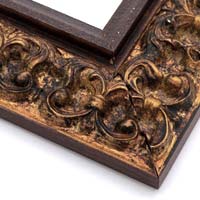 |
Color Calibration The measurement or adjustment of the way a device responds to the colors input to its system. In fine art printing, it is important that the designer's monitor is calibrated corrected so as to display the digital image as close to its original digital capture as possible. It is significant to note, however, that in the case of a reproduction, the original digital scan or photograph will not be identical to the physical artwork in color saturation.
Read more about color matching in art reproduction. |
| Color Triangle The primary colors arranged in a triangle, with one color at each corner. The additive color results are then blended within the rest of the triangle. For example: blue bleeding into yellow between those two corners, and yellow bleeding into red between those two colors. |
| Color Wheel Identifies the primary, secondary and tertiary colors and their relation to one another. More detailed color wheels show possible shades of each color, when mixed with varying amounts of white. |
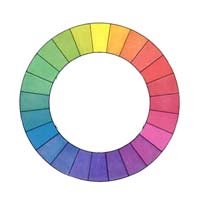 |
| Common nail Common nails are made from iron wire and have a thick, smooth body with a sharply pointed tip. The head of the nail is wide, generally about twice the width of the body. |
| Complementary colours A pair of colors that produce black when combined (or in the case of colored light, white). Placed side by side, this pair creates the greatest possible contract between the colors. Complementary color pairs in the RGB model: red and cyan; yellow and blue; magenta and green. |
| Compo A shortened term for "composition ornamentation", a method of applying raised designs to a flat surface. In picture framing, it is the application of decoration to the frame face. A mold is made of the desired design, from clay or plaster, and then pressed onto the wood face. Once the entire piece is painted or otherwise finished, the molded design and the wood frame appear as a single piece. |
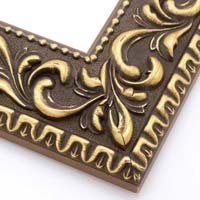 |
| Composition The layout or arrangement of an artwork. The artist "composes" the work by determining where the visual elements should lie within the viewing space. Different arrangements, such as the main subject close to the viewer, or moved far back in the scene, lend different moods to the finished work. |
Conservation The act of preserving or protecting an artwork by taking various steps to ensure its longevity. The products used may include paper-free matboard, acid-free backing, and UV-resistant glazing and inks.
Order online:
Conservation Matboards
Acid-free Foam Board |
| Conservation Framing Conservation picture framing results in an archival quality display, and ensures that whatever processes are done to the art can be reversed without damaging the original piece. It requires the use of acid-free materials (paper, backing, adhesives) and UV-protective glass or plexiglass. |
| Conservator Also called a "conservator-restorer", this professional works on archival artworks, ensuring their survival through cleaning, restoration and proper display and storage. They are trained to recognize and eliminate damage and deterioration. |
| Contemporary Ornament A modern style, usually featuring smooth lines and a simple, unadorned frame face. |
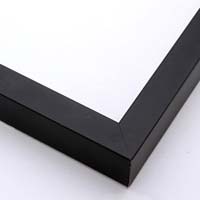 |
| Contemporary Style Picture frame decoration identified by a modern style. Generally featuring smooth lines and a simple, unadorned frame face. Contemporary frames come in a variety of finishes, and may be boldly colored, natural (wood grain) or metallic. |
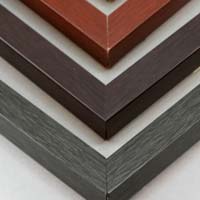 |
| Contrast Ratio Contrast ratio is a measure of the difference in brightness between the lightest and darkest parts of an image or display. It is typically expressed as a ratio, such as 1000:1, where the first number represents the luminance of the brightest area and the second number represents the luminance of the darkest area. In Giclée printing, contrast ratio is an important consideration for evaluating the dynamic range and visual impact of printed images, with higher contrast ratios generally indicating greater detail and depth. |
| Convex Glass Convex glass is pane glass that is curved outward into a dome shape. It was common as a picture frame cover in the early days of photography. Also referred to as "bubble glass." |
| Copyright A legal right that allows the owner of a product or service to retain singular ownership. Copyright grants the owner exclusivity in distribution and use and ensures they receive proper compensation for their product. |
 |
Core The internal material of an object. In picture framing, "core" refers to multiple materials:
1. the cotton fiber filling between the colored surface and backing of mat boards, which may be white or black. The part that is visible in the bevel along the opening.
2. Foam core, a lightweight but firm material used as the backing in framed artwork. It is constructed of a thin (approximately 1/4”) foam sheet sandwiched between layers of thick, generally glossy, paper. |
 |
Cork Boards Any material, the surface of which is covered by a layer of sheet cork. The layer may be thick or thin, and is usually backed by MDF or cardboard, sometimes with a sheet of foam between the cork and backing.
Cork boards are generally used to display paper items using push pins or staples pressed into the cork surface. We offer cork board as a backing option for picture frames.
Order online: Cork Board |
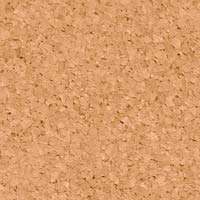 |
Corner samples In picture framing, a frame molding sample comprised of two short (generally 6"-8") pieces of molding cut at 45 degree angles and joined to represent the corner piece of a completed frame.
The sample can be laid against printed or original artworks to determine the best frame match.
The image shows two corner samples. |
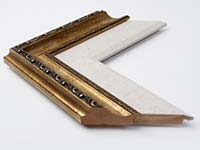 |
| Corner weld glue The glue used to affix picture frame molding at the corners. It is designed to dry quickly and clear, and excess can be easily removed with water. |
| Corrugated Cardboard Thick, sturdy paper comprised of two smooth layers with a layer of ridged paper in between. Used as a packing material and as a backing. |
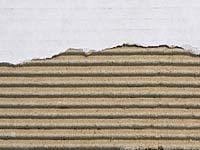 |
| Corrugated Corners Pre-formed, corrugated cardboard shapes that fit around the corners of picture frames and square edges to better protect fragile items. Corrugated cardboard is comprised of two layers of flat cardboard with a layer of ridged cardboard sandwiched between. |
Cotton A soft fiber made from the cotton plant. It is highly versatile, and in picture framing is used in mat boards, fine art papers and canvas.
This white vegetable fiber grown in warmer climates in many parts of the world, has been used to produce many types of fabric for hundreds of years. Cotton fabric feels good against the skin regardless of the temperature or the humidity. |
 |
| Cotton Linters The fine, silky pieces of cotton that stick to the cotton plant after the initial harvest (ginning). The paper manufacture from these pieces is called "rag mat". |
Cotton rag Paper made from 100% cotton fibre. Unlike most paper made from wood pulp, cotton rag paper is stronger, more durable, acid-free, and suitable for archival purposes.
Order online:
100% Cotton Matboard
Stretched Artist Canvas
Rolled Artist Canvas |
| Cracking A painting texture achieved by using a milk-like medium over the coat of paint that shrinks, causing the paint to crack. The result is an antiqued appearance on painted wood. |
| Craze The fine cracks that appear along the surface of acrylic sheeting and within hardened varnish when too much pressure has been applied. |
| Crazing The fine cracking that occurs along the surface of acrylic sheeting and within hardened varnish when too much pressure has been applied. |
| Cresent Matboards A long-standing, family-owned producer and seller of mat board, located in the United States. |
| Crimping Pliers A tool used to press metal together in order to flatten it. In picture framing, crimping pliers are used to close the small metal tubes ("crimping sleeves") through which both ends of the hanging wire is strung, an alternative to wrapping and twisting or knotting the wire. |
Crimping Sleeves The small metal tubes through which hanging wire is strung, to secure it to the frame. The wire is threaded through the sleeve, then into the hanger affixed to the frame, and then back through the sleeve. When the sleeve is crimped with crimping pliers, the wire is held tight between the flattened metal.
Order online: Crimping Sleeves |
| Cropping corners The action of trimming excess from the corners of an image or mat board, usually in order to make it fit better within the frame. The corners may be cut straight across, so a triangular piece is removed, or they may be rounded into a crescent shape. |
| Cutting Mats Thick plastic mats that serve as a protective surface when cutting with a utility blade. They are generally painted with a grid to ensure straight lines when cutting photographs, mat board or other paper products. |
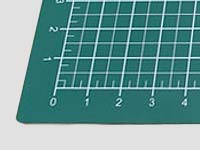 |

